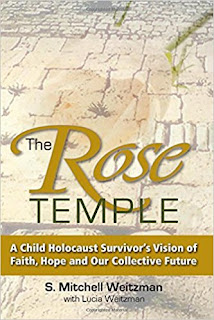S. Mitchell Weitzman is the author, with his mother, Lucia Weitzman, of the book The Rose Temple: A Child Holocaust Survivor's Vision of Faith, Hope and Our Collective Future. He is a counsel with the Food and Drug Administration in the Washington, D.C., area, and his work has appeared in publications including Washington Jewish Week and Coping.
Q: Why
did you and your mother decide to write a book about her life?
A: Publishing
a book was the last thing my mother imagined doing. Her childhood vulnerabilities and fears as
the lone Jew remaining in her postwar Polish hometown still
lingered. Privacy was her natural impulse.
Placed
by her parents into the care of a Catholic couple in a desperate attempt to
save her, my mother’s background merits documentation for historical purposes.
Unlike
the Jewish children hidden with Catholics and later reunited with relatives, or
those who learned later in life that they were Jewish, my mother found out she
was Jewish at age five. She struggled with, and because of, her dual identity
throughout the remainder of her childhood and adolescence.
But
the main impetus for writing the book began once she undertook a spiritual
journey in midlife, after my father died. On one level the journey was
personal, addressing her search for her authentic self and her life purpose
after others had long since labeled or defined her.
However,
on another level, Biblically-symbolic messages she received through dreams and
inspired writings spoke to a broader purpose and our decision to publish. They
indicated the need for a shifting global consciousness from a paradigm of
divisiveness and intolerance to one of healing and connectedness.
Q: How
did you separate your roles as son and writer as you examined your mother’s
story? How did the two of you work together on the project?
A: As
a writer, I tried to maintain a certain distance so that I captured a real-life
woman, not just an admired, beloved mother. I would write her story
independently, imagining how she must have felt, and then she would send me
notes or an interview transcript.
Sometimes
we found amazing synchronicity; at other times, I captured thoughts and
emotions she hadn’t yet acknowledged or internalized, like her relationship
with Jesus. In fact, I once went to Mass so I could better understand her
experience.
That
said, there were several very emotional, revelatory moments during our writing
process. At one point during a trip to her hometown in Poland, she disclosed
that her adoptive father had made advances to her after she turned 13.
She lived in constant fear of him.
I’d
always thought that her home was a refuge from the challenges she faced at
school and in her neighborhood. This was a shock—and I was already midway
through the book. Needless to say, the need to revise was the least of my
concerns.
Q: You
begin and end the book by reflecting on a question about God’s involvement—or
lack of involvement--during times like the Holocaust. How would your mother
answer this question?
A: As
we say in the book, the question about God’s presence or absence during the
Holocaust is one that theologians, scholars, and others have asked for decades.
There may be no definitive answer.
Interestingly,
the question itself emerged from my mother’s “inspired” writing, which is
writing that originated as a thought perceived or sensed as a voice which she
believed to be Divine. It was as if God wanted
the question to be asked as a means of engagement. The
answer, for my mother, is that God was, is, and always will be present in her
life.
Is
her answer the answer for everyone? “People must follow their own path,” my
mother says, “and questions and answers about God’s presence must come from
within."
In
the epilogue, I turn the question around.
Instead of asking about God’s presence in our
world, I pose that we consider our presence in His.
 |
| Lucia Weitzman |
Q: How
was the book’s title chosen, and what does it signify for you?
A: My
mother’s birth name was Rose. At a pivotal point during
her spiritual journey, she sensed the Divine voice entering her consciousness,
telling her that her work will “help rebuild the temple.”
She
had no idea what that meant, but later learned that the temple is a temple of
love, not a physical place. She explains:
“For me, The Rose Temple is about God’s love for us and what I believe is His
hope for us to love each other.”
Q: What
are you working on now?
A: Inspired
by my 9-year-old niece, I am adapting The Rose Temple
for children. She read the book and felt empowered enough by it to confront
someone in her class who was bullying her.
The
children’s version, entitled Rose’s Gift, will
focus on
my mother’s schoolgirl years. Hopefully it will inspire
any child who has ever felt the pain of being different, and who has searched
for strength in situations where they might otherwise feel powerless.
I
am also working on another children’s book that, improbably, combines baseball,
religion, mysticism and music. Stay tuned for that one.
Q: Anything
else we should know?
A: A
spiritual journey doesn’t end when a book does. My
mother continues to write and share her experiences with me, touching on topics
that are at the very core of religion and history.
The
book’s website is intended to offer more than just informational or promotional support for
the book. We see it as an evolving virtual place; a concept, a community, or a
movement—however you wish to define it—whose mission is to help transform our
troubled world into an era of global harmony blessed with Divine love and
light: in short, a force for good in the world.
--Interview with Deborah Kalb


No comments:
Post a Comment